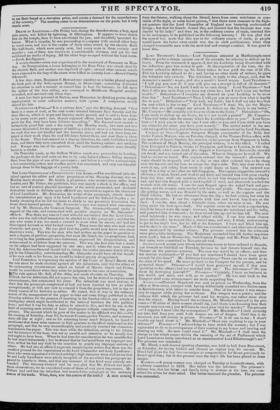THE LORD CHANCELLOR'S PROSECUTIONS FOR LIBEL.-TIIC conilitional rule obtained against
the editor and other proprietors of the Morning Jou rnal, wits on
Monday made absolute. Mr. Gutch, a proprietor, who resided many miles from London, and Mr. Fisher, the publisher, who was merely a clerk in the office, and had no sort of control, pleaded ignorance of the article prosecuted, and declared themselves ready to disclaim upon affidavit any intention to asperse the character of Lord Lyndhurst. Mr. Alexander, the writer of the paragraph, utterly denied the interpretation put upon it by Lord Lyndhurst and Sir Edward Sieuleu ; solemnly swearing that he did not mean to allude to any pecuniary transaction be tween these learned persons. Mr. Alexander's case was argued with uncommon zeal by Mr. Demnan, the Common Sergeant. The Attorney-General spoke in support of the rule, and commented with peculiar severity on Mr. Alexander's affidavit. Was there any man in Court who did not believe that the Lord Chancellor was the individual intended to be alluded to in this paragraph ; and that the man who wrote it was too much a coward to avow what lie meant, and had too little regard for truth in what he had sworn ? These were the men who took away . character, and gave it. He was glad that the public would now know who these slanderers were. This was the man who had written up the paper in question to such a degree of perilous prosperity, that even Mr. Glitch, his co-proprietor, had, according to that gentleman's own statement, expressed his disapprobation, and endeavoured to withdraw from the concern. This was the first time that a doubt on the subject had been suggested by any one; and if, when the case canoe to trial, the Attorney-General should fail to satisfy the twelve jurymen that it did apply to the Chancellor, notwithstanding Mr. Alexander would have all the benefit of his own oath in his favour, he should be indeed greatly disappointed.
Lord Tenterden, in expressing the opinion of the Court of King's Bench, that the rule must be made absolute against all the defendants, said that the effect of the extenuating circumstances urged on behalf of Messrs. Gutch and Fisher, would be considered when they came for judgment in the case of conviction. Wile rule against Mr. Bell, of the ilitas, was made absolute on Thursday. Mr. Pollock, for tee defendant, did not oppose the rule, but he wished to explain some
circumstances, that extenuated his error. The defendant was most anxious to show that the paragraph complained of had not been inserted by him as editor surreptitiously, or with any view to conceal it from the proprietors, but in the or dinary course of his business as editor. He stated, that it was in the ordinary course of the management of the paper to take out some things published in tine Saturday edition, for the purpose of inserting in the Sunday edition any article of
intelligence which might be collected in the interval between the two publications; and that it was his duty as editor to attend to this, and that he was in the habit of inserting such articles of later intelligence without consulting the proprietors. The account which he.gave of the matter in his affidavit was this
the evening of Saturday, June 13, he was at Covent-garden Theatre, and remained there till late at night ; and on his returning home much fatigued, he heard it mentioned that there were rumours in high quarters to the effect mentioned in the paragraph, and that he very inconsiderately and carelessly inserted the obnoxious statementin the paper. This was done while the defendant, owing to his fatigue
and the lateness of the hour, was not so careful and attentive as he usually was and ought to have been. When he had time for consideration he was sensible that he hail acted indiscreetly ; but he denied that he had acted from any improper motives, orthat he had any wish by the insertion to gratify any improper motives of others. He had also an affidavit expressly negativing the notion that there was the smallest ground for the imputations on the Lord Chancellor and Lady Lyndhurst : those who were acquainted with his Lordship's high character were well aware that he and Lady Lyndhurst were utterly incapabla of the act which the paragraph appeared to impute to them, and that any rumours of that kind were entirely unfounded. The Attorney-General said he was glad that Mr. Pollock had made these observations, for he considered some of them of very great importance. Mr. Pollock had said that the defendant had inserted this paragraph in the ordinary course of his trade. What, then, was the course of the trade A man coming from the theatre, walking along the Strand, hears from some watchman or constable of the night, or some lower person, f4 that there were rumours in the highest quarters that the Lord Chancellor of England was bartering ecclesiastical livings ; but that his friends denied this, and insisted that the business was conducted by his lady:" and then he, in the ordinary course of trade, inserted this
in his newspaper, to be published on the following morning He was glad that the avowal was made that this was in the ordinary course of trade, as people would know the better what credit was due to such publications, when they charged honourable men with the most foul and corrupt conduct. It was good to know this.


















 Previous page
Previous page